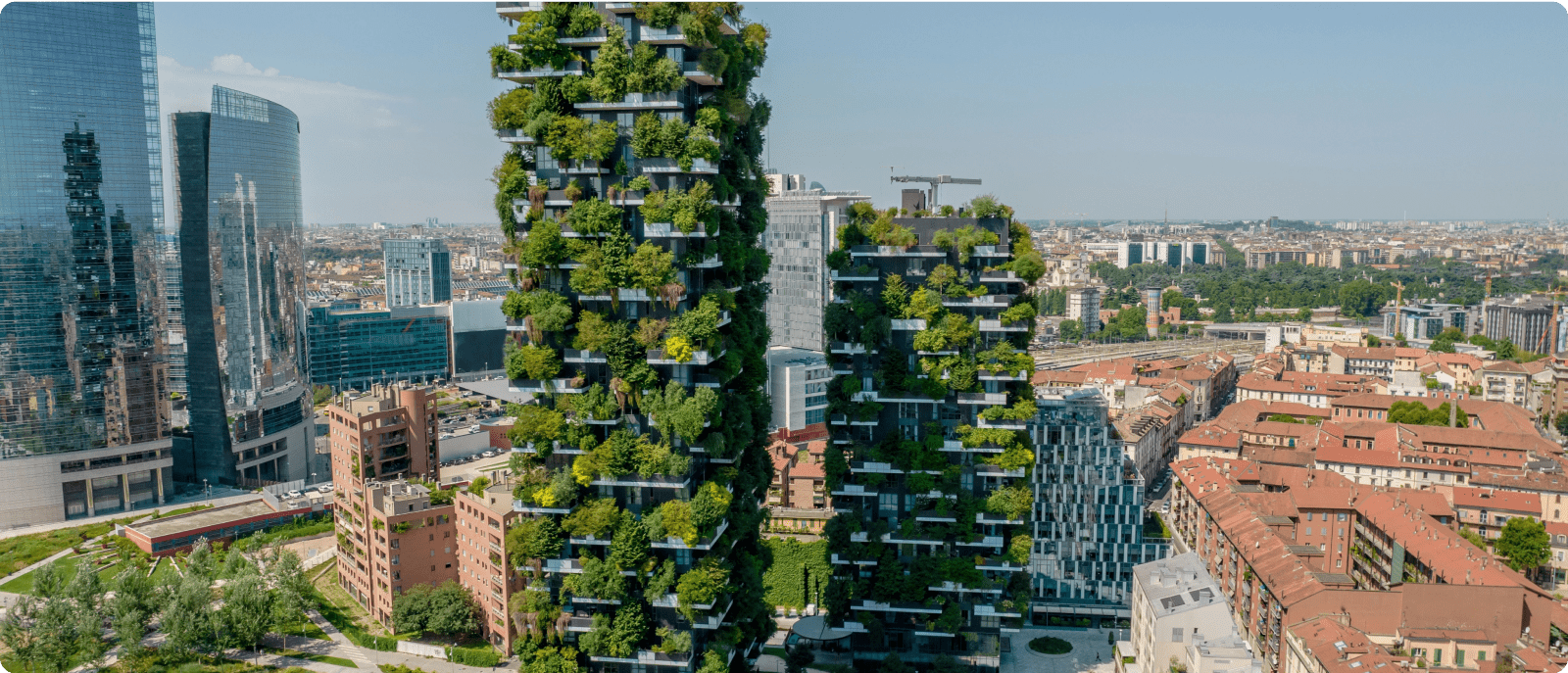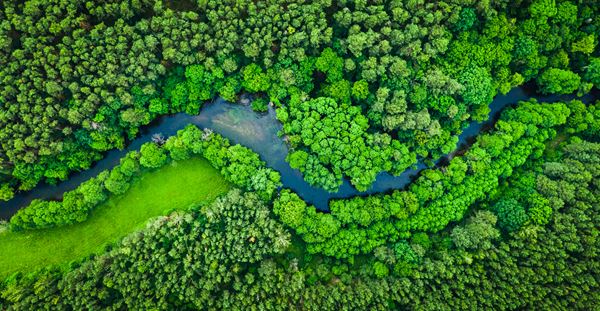Our planet is heating up faster than ever, with 2023 marking one of the hottest years on record1. As we face increasingly severe climate impacts, we stand at a critical juncture. This is not merely an environmental issue; it is a defining challenge that requires a fundamental shift in how we interact with the environment, structure our economies, and organize our societies.
Cities, infrastructure and communities face unprecedented threats, and the time for incremental change has passed. This moment demands bold action, as the interconnected nature of climate challenges - ranging from extreme heat to intensified rainfall and rising groundwater tables2 - threatens the very livability of our cities and communities. The decisions we make today will shape the future of our planet for generations.
In our 'Future of Climate' series, we reflect on the key opportunities and game changers that are influencing positive change and accelerating climate resilience for communities and businesses alike.
In this perspective, we focus on how we can redefine climate solutions with bold actions.
Urgency of Action

For government bodies, the urgency of addressing climate change lies in protecting public health, infrastructure, natural resources and economic stability. Recent events, such as the severe heatwave in Midwest and Northeast US in June 2024 causing infrastructure disruptions and drought-light conditions3, and the heavy rainfalls in southern Brazil in May 2024 that displaced about 150,000 people, underscore the need for immediate action. These are not isolated incidents, but part of a broader pattern of increasingly severe and overlapping climate hazards that demand proactive policy and investment decisions. These interconnected threats not only jeopardize infrastructure but also endanger the cultural traditions and values that have defined our communities for centuries.
-
Read more
Meanwhile, as extreme weather events become more frequent, properties in vulnerable areas face depreciating values, increased insurance premiums, and investment risks. Protecting and restoring ecosystems and safeguarding biodiversity are crucial for mitigating these impacts, as healthy ecosystems provide natural defenses against climate hazards. Consequently, the market for resilient infrastructure and sustainable developments that can withstand climate impacts is rising in demand, attracting significant investor interest.
Climate change mitigation in action: A case from the Coastal Protection and Restoration Authority (CPRA) of Louisiana
The Coastal Protection and Restoration Authority (CPRA) of Louisiana faces significant challenges associated with the uncertainties of climate change, including sea-level rise, increased storm frequency and intensity, and the acceleration of coastal land loss. To address these, the CPRA's long-term planning considers adaptive measures such as restoring ecosystems, enhancing infrastructure, and improving community resilience.
“By incorporating future climate projections into our Coastal Master Plan, we aim to protect Louisiana's coast and reduce the risks of flooding and land loss under multiple possible future climate scenarios.
Recognizing the uncertainty brought by future environmental conditions, we update our Coastal Master Plan every six years, applying the latest and best available science to update our models of current environmental conditions with more than one possible future scenario.
We then prioritize projects that perform well across multiple future scenarios to increase the probability that our projects will yield the benefits we expect.”

Sam Martin
Senior Scientist Coastal Resources, CPRA
We need transformative solutions that tackle the root causes of climate vulnerability and enhance the resilience of our cities, communities, and businesses. This includes protecting and restoring ecosystems and safeguarding biodiversity, which are vital for reducing risks and strengthening natural defenses against climate impacts. A proactive, collaborative, and action-oriented approach is key - one that anticipates future risks, balances immediate actions with long-term planning, and integrates layered, complementary strategies.
Redefining Climate Solutions

So, can we transform our cities into thriving ecosystems that not only survive, but thrive in the face of climate change? We need to start thinking differently about the climate solutions - beyond traditional approaches that focus solely on adaptation and mitigation. This means adopting a more holistic perspective that redefines our relationship with both the environment and infrastructure. Embracing nature-positive practices that harness the power of natural systems to absorb and adapt to climate impacts are key. For example, urban forests, like those in Paris, can cool cities, reduce energy demand, and mitigate the heatwave effects. Additionally, adaptation solutions should be designed to provide multiple community benefits, extending their value beyond a single use.
-
Read more
We also need to rethink how we fund climate action. Innovative financing mechanisms, such as green bonds, resilience funds, and insurance-based mechanisms, can provide the resources necessary to scale up sustainable development investments. As of January 2023, green bonds raised $2.5 trillion (about $7,700 per person in the US) globally4, reflecting growing investor interest in financing green and sustainable projects that combat climate change. By aligning financial incentives with environmental and social goals, we can drive investment in projects that address climate risks and livability in cities, while tapping into a growing market of climate-conscious consumers and investors.
Interconnected Systems

The complexities of climate change require a systems-based approach that recognizes the interconnectedness of various climate hazards. For instance, increasing temperatures lead to a warmer atmosphere that can hold more water, intensifying rainfall and contributing to flooding. Rising groundwater tables, in turn, can compromise the stability of buildings and infrastructure, while also leading to saltwater intrusion in coastal areas, compromising drinking water sources. Addressing these challenges requires integrated solutions that consider the interactions between different climate factors and their cumulative impacts on urban environments.
-
Read more
The Santa Monica Sustainable Water Infrastructure Project enhances climate resilience by integrating advanced water recycling with stormwater management systems to treat up to 1.5 million gallons of water daily. This reduces reliance on imported water and mitigates drought impacts by ensuring a sustainable local water supply. The project exemplifies an interconnected systems approach, capturing and treating stormwater to prevent flooding, recharge aquifers, and reduce ocean pollution. And supports the city’s climate adaptation goals, strengthening its urban water infrastructure resilience.
No single solution can address the entire spectrum of climate challenges. Adopting interconnected perspective enables more resilient strategies that are adaptable to the uncertainties of climate change. Advanced modeling technologies like Arcadis’ Climate Risk Nexus can help cities and organizations better understand the interactions between various climate hazards and impacts on different types of infrastructure to better anticipate and respond to risks with proactive measures.
Global and Local Perspectives

While climate change is a global issue, its effects are most profoundly felt at the local level. Cities and communities face unique challenges shaped by their specific geography, climate, and socioeconomic conditions. Despite these differences, there is significant value in sharing knowledge and best practices through peer-to-peer exchanges and roundtable discussions.
-
Read more
While there is one-size-fits-all solution to climate change, cities that have successfully implemented nature-based solutions for flood management can provide crucial insights to those dealing with similar challenges. Empowering local communities to develop and implement climate strategies that address their specific needs and priorities is crucial. For governments and municipal bodies, this means facilitating participatory approaches that actively involve residents in decision-making processes and ensuring that climate actions are equitable and inclusive.
The Liveable Neighbourhoods Programme in Glasgow focused on transforming local areas into more sustainable, accessible, and safe spaces through active community and stakeholder engagement. The project involved workshops and consultations with residents to ensure that the neighborhood designs reflected their needs, improving walkability and reducing traffic congestion. This approach not only enhanced quality of life but also supported the city’s broader sustainable urban development goals.
Three bold actions we can take now:
-
Prioritize Multi-Hazard Urban Planning
Cities must integrate climate resilience into their planning processes, focusing on multi-hazard approaches that address the interconnections between heat, rainfall, storm surge, and sea level rise. This includes updating building codes, enhancing green infrastructure, and designing adaptable, multi-use urban spaces that can withstand a range of climate impacts.
-
Scale Up Adaptation Investments
Governments and private sector leaders must collaborate to create new financial instruments that support large-scale adaptation investments. This could involve establishing resilience bonds, investing in green infrastructure funds, rethinking insurance or incentivizing private investments in projects that reduce climate risks while enhancing urban livability.
-
Empower Communities and Diverse Voices
In our collaborations with governments to deploy projects, it's essential to recognize that the true experts are the residents and business owners who experience the daily impacts of climate change. Our role as planners, engineers, and scientists is to leverage our tools and expertise to enhance community capacity, educate about climate impacts, co-create plans, and ensure equitable empowerment of diverse populations. By doing so, we can ensure that climate strategies are not only effective but also inclusive.
Climate change is the defining challenge of our time, but it also offers a chance to redefine our relationship with the environment, infrastructure, and each other. For governments, this is a chance to lead with visionary policies and investments that safeguard public welfare. For the property and investment sectors, it’s an opportunity to create resilient, future-proof developments that meet the demands of a rapidly changing world. Are we ready to seize this opportunity with determination, or will we look back and wonder if we could have done more? The time to act is now; the decisions we make today will shape our collective future.
Sources:
1. World Meteorological Organization
2. BBC: How climate change worsens heatwaves, droughts, wildfires and floods
3. NASA Earth Observatory: A blast of heat in the east
4. World Bank




